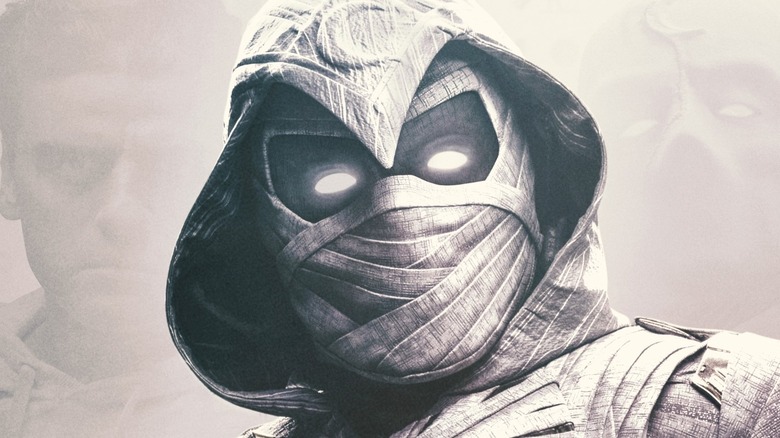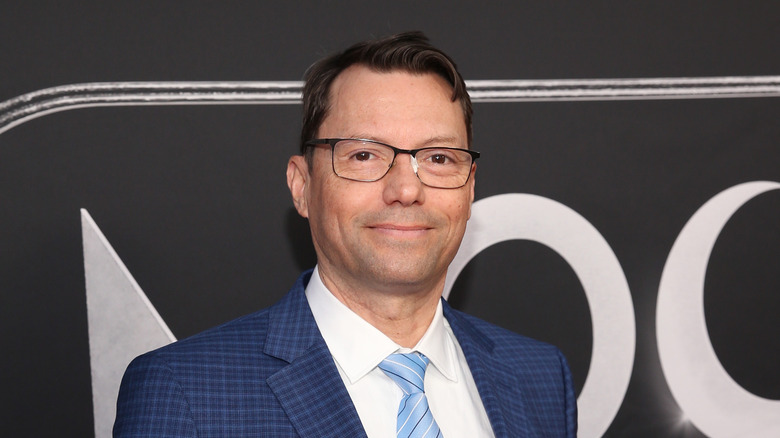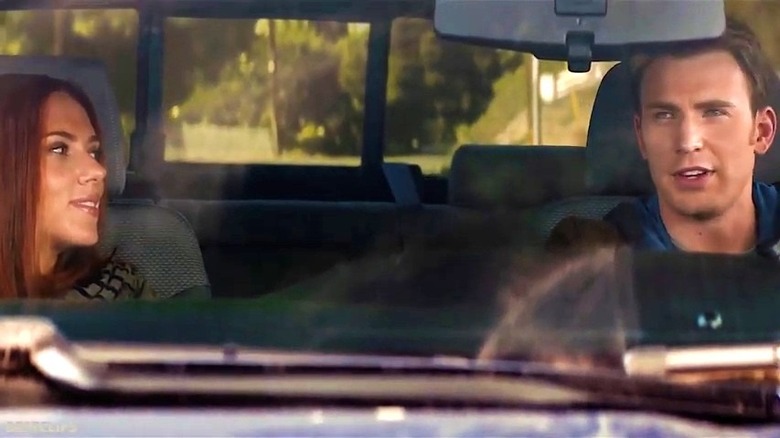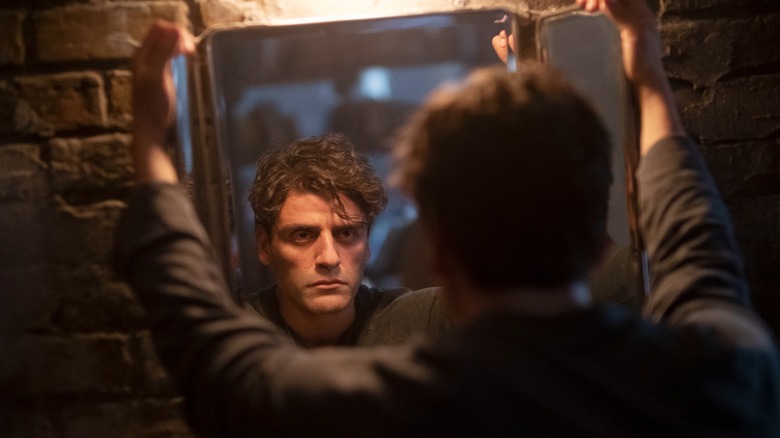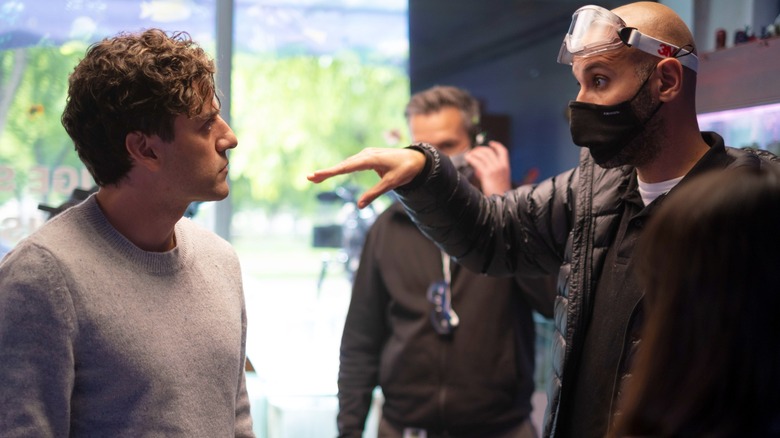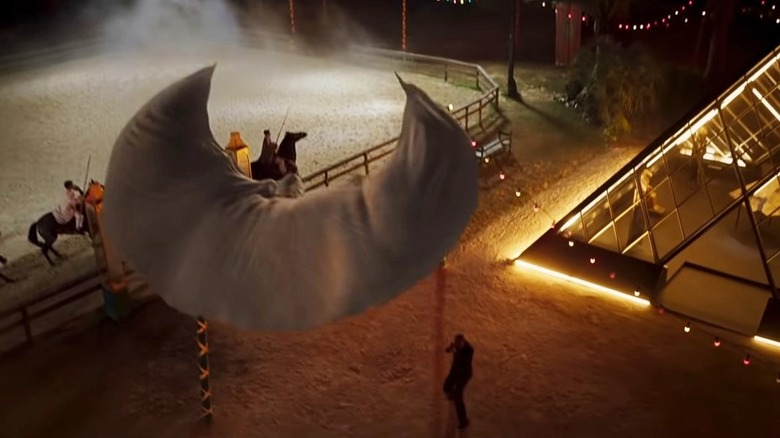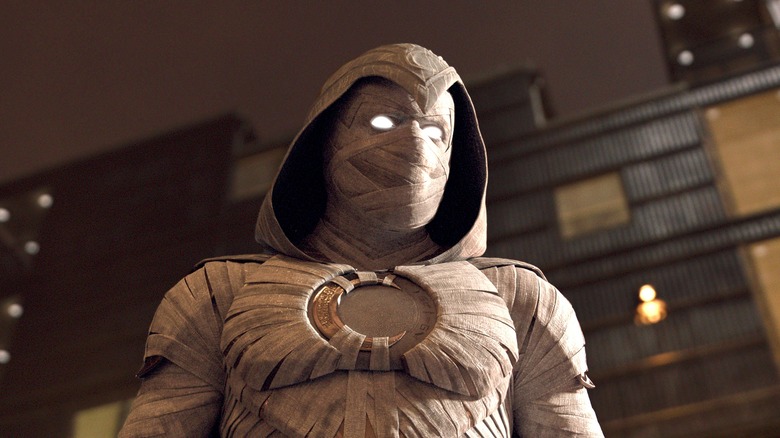Cinematographer Gregory Middleton On Moon Knight And Oscar Isaac - Exclusive Interview
With more than 60 credits that span over his 30-year career in film and television, cinematographer Gregory Middleton has shot projects in several genres, including dramas ("The Killing"), sci-fi ("Fringe"), action fantasies ("Game of Thrones"), and superhero series ("Watchmen"). His experience in the latter genre came in handy when executive-producer and director Mohamed Diab was seeking a cinematographer to realize his vision for the Marvel Studios series "Moon Knight" — but it was the complex nature of "Watchmen" that piqued the filmmaker's interest.
Streaming exclusively on Disney+, "Moon Knight" follows the harrowing path of Marc Spector, a former U.S. Marine and mercenary trying to navigate dangerous circumstances as he deals with dissociative identity disorder. As such, Spector lives part of his life as Steven Grant, a nebbish, former Egyptian museum gift shop worker in London who acknowledges Marc's presence but struggles to give up his persona to Marc in urgent matters.
That's especially a problem since they serve as the avatar of Khonshu (voice of F. Murray Abraham), the Egyptian god of the moon, giving Marc/Steven the ability to summon the suit and powers of the superhero Moon Knight — or a variation of him known as Mr. Knight. Together they need to stop the dangerous cult leader and Khonshu's former avatar, Arthur Harrow (Ethan Hawke), who is looking to awaken the Egyptian god Ammit to create havoc throughout the world.
Streaming exclusively on Disney+, "Moon Knight" is made up of six chapters, with Episodes 1, 3, 5 and 6 directed by Diab and Middleton serving as the director of photography. For Episodes 2 and 4, director team Aaron Moorhead and Justin Benson are at the helm, with Andrew Droz Palermo taking on cinematographer duties. In an exclusive interview with Looper, Middleton recalled his collaboration with Diab and Isaac, as well as the impact previous MCU films have had on him.
How Watchmen got Middleton on Diab's radar
"Moon Knight" really does cover the entire spectrum in terms of the sort of action you would expect from a superhero series, but it also leaves that great room for character development. What was more important in you getting the job: Was it your work on "Game of Thrones" and "Watchmen" or could it go as far back as "The Killing," because it's an intense character drama?
Thank you very much for mentioning "The Killing" because I'm proud of my work on that show and also how much much character stuff is there. I've not worked for Marvel before, and the "Watchmen" show is what brought me to their attention the most, because [of] the mind-bending element — especially Episode 6 — it was on a journey through somebody's fever dream. That was one of the reasons I was on Mohamed's short list of people to interview for the project.
All those shows — you mentioned all three of them — the most interesting part about them is that they're character-driven. The plot comes out of character. "Moon Knight," in particular, is about someone who is essentially reconciling two different parts of himself. It's an entire plot that comes out of character. It's very smart with both Ethan's help and the writers, and Mohamed, and Justin and Aaron, to wrap Ethan's character into another fold of that. Being a former avatar, he's a cautionary tale, and I'm really excited about stories that come from that because drama is about understanding people as much as telling a story. If that is part of the engine that drives the story, usually, it's much more engaging.
Middleton was inspired shots in The Winter Solider and Avengers
Since the Marvel Cinematic Universe dates back to 2008 with "Iron Man," I'm wondering if you've kept an eye on the MCU from afar. There are a lot of films to look at, but do you recall any specific shots that inspired you?
What's interesting, actually, is I have seen all the films ... and some of my favorite moments are with the character moments. I can think of Steve Rogers and Natasha [Romanoff] and the pickup truck in "The Winter Soldier," talking about what it's like to be a spy, and [Natasha saying in effect], "I think you're in the wrong business, Rogers." That's what interests me the most.
There's an amazing shot in the first "Avengers" by Seamus McGarvey, [which is] right around the time that [Agent] Coulson dies, and it's that out of a comic panel. We've got Iron Man in the foreground and there's the sun coming through the broken part of the Helicarrier. You've got all three of them composed and it's a real comic book frame, which [is] a way to bring a bit of the art of the competition and parts of comics into the cinema realm, without it being over the top and being a slave to it. That's one of the things about an adaptation. It is honoring that piece of art and using it in a way to help form it that will also work within cinematic storytelling, and there's some amazing issues like that.
Middleton loves how Moon Knight is character-driven
Having seen all the MCU films, were you also a comic book reader? Was that the impetus of this large, overall drive to get involved with a comic book film?
The genre of the story is secondary to what the story's about. The genres like this, you can tell a story about this thing in a really fantastical way, which you can't do in a lot of other mediums, and it can still be very moving and human. It doesn't remove that from it, and that's what comics could do. That's what, even in some ways, what "Watchmen" was doing, trying to humanize and show the issues with those characters ... It's like you're playing in a sandbox of a known language, but you are also telling a certain specific type of story.
With "Moon Knight" being so character driven in that sandbox, I found that opportunity incredibly exciting, because it could be really unique in a lot of ways, both visually and also from the point of view. Someone once said, "If you're going to think about making a film project or a TV project, there's three things to think about: Why tell the story now, why tell it this way, and why tell it now?" Making this story from within the character's perspective, it's an amazing choice by [showrunner] Jeremy [Slater] and everyone embraced wholeheartedly. It's an amazing part of it.
Middleton is fascinated by Diab's unique creativity
You work on your four episodes Mohamed Diab, who I talked with at the very beginning of the season. I'm wondering the insights that he brought to the miniseries, his unique cultural insights, since he's an Egyptian director. What did you learn from Mohamed that maybe you haven't learned from other directors that you worked with?
He's a fascinating character and a real genius. He, as an Egyptian, wanted to make sure his culture and other cities and everything was represented in a way that was cosmopolitan and full, as I'm sure he told you, and not just like it's a desert and a shovel and that kind of thing. Not only that, but the thing about his films is, when I saw "Clash" and "Amira," which I think is amazing, he's a real humanist. He's really interested in what makes people tick and making his stories about the conflicts that come up when people have different ideas about themselves or when they're in conflict. This is a story about exactly that. When I saw [the films, I was] like, "Oh, now I know why they picked him for this," because you have to be grounded in that to tell this story really well.
The other thing that's fascinating about him as a creative person is he is one of these people that can always access that left part of his creative brain and always look for another way to connect things together in a way, which can be sometimes a bit late in the day — which can cause some concerns when I'm on set and I'm suddenly doing a scene in a different place — but it's also an incredible ability to be able to constantly do that. It's ... almost like a writer's brain, in terms of how you connect things to which will resonate with an audience. The real trick with directing is telling a story in a way which you'll remember and will be clear to you without seeming too obvious.
Anatomy of a scene
Are there are any specific visual homages in "Moon Knight" from the comic book in the series, and also, did you have a favorite scene? I think my favorite so far is in Episode 3, in the scene where Moon Knight jumps and his cape unfurls into a crescent.
One thing about the project is every department and every creative person reads all the comics and looks at all the material. The great thing is everyone brings their own ideas to how to bring part of this to life. [Stunt coordinator] Livi [Schneider] and I were working on that [cape crescent] scene, and I pitched to him, "We should get him on top of the pyramid. We don't have the Moon cape in the show yet, and we're looking for an opportunity to do that. He was like, "Oh, well, if this fight stays this way, we could get him up there."
Then, we pitched the idea to Mohamed, and he was like, "Oh yeah, yeah. Well, then, we can actually get this and it's a chance to do that." We all had that image. We got to get this in there somewhere. It's like, "How do we fit it in?" Between Pat [Vo], our amazing fight coordinator, and Livi, we worked it out and said, "Oh yeah, we can do this, and then we can leap and figure how to do all that."
Middleton marveled at Isaac's work
Mohamed remarked how great of a collaborator Oscar Isaac is. Did you guys share ideas with each other?
It [was different] because of COVID. Normally on films, I might see him after work, but because of COVID, we all had to keep separated. The thing about Oscar was the heavy lifting he had to do to figure out how to play these two characters, how to make them distinct and also be the same person and how to map this journey. You shouldn't underestimate the effort involved in figuring out how to act [as] two players that are playing against each other, that all have their own unique journeys. It's twice the work. Also, you have to program someone else; in this case, his brother, Mike [Hernandez], to play that person while he's doing one performance.
A lot of our stuff was all about the blocking of when we were figuring out scene. At the end of the day, me and Mohamed and him would be like, "Okay, do you want to start with Steven tomorrow? Makes sense. Oh yeah, Steven's the one who will drive the scene. Who will dictate more how the scene is performed and where they go?" Then, we'd pick that character first because we can only change him once into the character. You can't go back and forth 20 times a day.
[That was a good chunk of it], and he's an amazing collaborator and absolutely great storyteller on his own. He's thinking about the story, not just about how to make it sense for the first character. Blocking with him, that's also one of the most fun things is to figure out, "Okay, what would Mark do here? And what would Steven do here? And how they would do that?" We start to get a feel for what each character and they say, "Well, if this happens, then maybe we should do this shot in this technique, maybe this is motion control of the two of them together, because now, maybe Marc is driving this and Steven is chasing."
Do you have a wish list of any other Marvel character projects that you would like to work on down the line?
Who knows? There's a run of the various supernatural characters, like "The Midnight Suns," which is a few of them together. That could be really fascinating. I would love to see Moon Knight and Oscar with other characters because he's such a fascinatingly interesting character that I would love to see him interact with all kinds of these other amazing characters.
"Moon Knight" is streaming exclusively on Disney+, with new episodes premiering every Wednesday through May 4.
This interview was edited for clarity.
